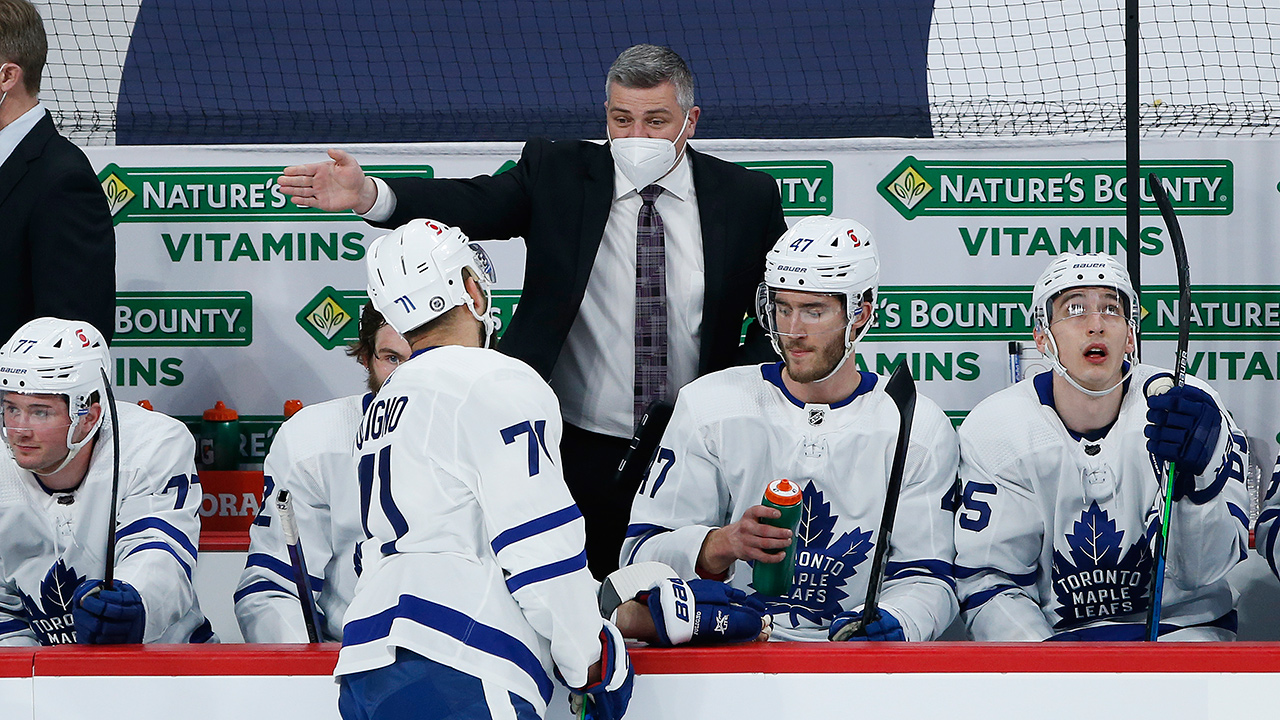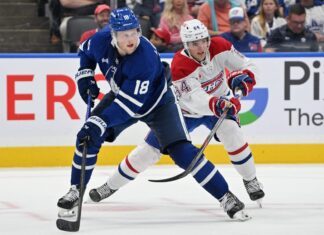As you may have heard, the Maple Leafs lost another first-round playoff series.
It’s not a fun time for anyone associated with the Leafs, but a solid action plan is needed to ensure that this team improves next season. Every radio show, podcast, tweet, blog post, and comment section will have a portion of opinions that are mostly true, and a portion of opinions that are mostly nonsense. We’ll try to stick to the truth as best we can here.
Firstly, changes are needed. Bad panic moves aren’t. If you’re going to trade Mitch Marner, you better win the deal. Disappointing playoff performances can lead a team into making horrible trades, and now more than ever, the Leafs need their front office to stay rational and level-headed.
They don’t need another David Clarkson contract on their hands. They can’t possibly trade Marner for the same sort of package that the Sabres got for Ryan O’Reilly. This is an important offseason that requires a sound strategy — not moves for the sake of moves.
Management
Let’s start at the top.
Personally, I have no interest in moving on from Brendan Shanahan or Kyle Dubas. This team doesn’t have a bad contract on its roster, drafts well, and continues to move in the right direction (despite the first-round exit). Their defense was completely rebuilt through the Jake Muzzin, TJ Brodie, and Justin Holl deals, all of whom are signed to reasonable contracts. They snatched Jack Campbell out of LA and signed him to a bargain $1.65 million cap hit through the 2021-22 season. The lack of offense against Columbus and Montreal is a concern, but I don’t think either executive should be on the hot seat yet.
That being said, both Shanahan and Dubas should acknowledge that when they went for leadership, grit, and experience in many of their moves this year, they didn’t always make the right bets on whether the players they acquired could still contribute enough on the ice. Joe Thornton wasn’t effective in the playoffs, Wayne Simmonds didn’t have a primary assist as a Maple Leaf, and Nick Foligno didn’t score a goal as a Maple Leaf.
For Thornton and Simmonds, the risk was quite low at the time of the signing, but they never even considered scratching either of them. In Foligno’s case, they passed up Hall and Palmieri when they needed more scoring. They need to ensure they’re acquiring impactful enough players in the process of addressing these elements.
This team opened Game 1 of the playoffs with a major scoring depth problem. Spezza played on the wing nearly all season, but he was asked to play center on a line with Thornton and Simmonds. The line seriously lacked speed and transition skill — there’s a reason why they barely played those three players on a line together in the regular season. Tossing Riley Nash onto a line with Ilya Mikheyev basically gave them another unit with no offense.
Foligno is a fine player, but he hasn’t been much of a scorer in recent seasons. He was injured come playoff time, but he doesn’t bring all that much to the table offensively even when he is healthy. Alex Galchenyuk went from being apparently good enough to change the team’s deadline plans to a healthy scratch in Game 1. I’m still fine with the process of giving up picks to add David Rittich, Ben Hutton, and Riley Nash for depth, but Foligno wasn’t the right guy for the job.
The Leafs need their star players to be the leaders of this team. Assuming they all return, Tavares, Matthews, Marner, Nylander, Hyman, Muzzin, Brodie, and Rielly are the leaders of this group. Given how effective he’s been, you can add in Spezza as well. For all the talk about the leadership abilities of Foligno, Thornton, and Simmonds, it got them nowhere when the team treated the first 40 minutes of Game 5 like a preseason game.
Scoring depth is a problem. They struggled to score against Columbus and again against Montreal. This team needs to be able to score like the Avalanche can score — certainly, they need to evaluate their core group up front as a part of this, but they need to be able to match the scoring depth of Colorado as well.
The lack of scoring from the core forwards was the biggest problem in the Montreal series. However, given how close the series was, they could have overcome the struggles of Matthews and Marner — who likely would’ve snapped out of it eventually with a longer playoff runway — if they didn’t have so many holes in their lineup. Management simply did not round out this forward group very well.
Coaching
Sheldon Keefe is a capable NHL head coach by my estimation. However, he’s struggled in back-to-back playoff series, and given that Bruce Boudreau is sitting at home, Kyle Dubas has to at least take some time to consider his options. I’d certainly bet on Keefe returning, but I suppose I wouldn’t be completely shocked if a change was made.
As mentioned above, Keefe’s Game 1 lineup left something to be desired. Alex Galchenyuk and Pierre Engvall deserved to play, but the team didn’t appear to put a second of thought into scratching Thornton or Simmonds. Of course, none of Keefe’s lineup decisions were as mystifying as scratching Cole Caufield, but I didn’t like that lineup spots were handed out based on name recognition rather than performance. Scratching Thornton or Simmonds in the first game of the regular season would be a crime, but everything should be on the table come playoff time.
As has been discussed ad nauseam, there is really no excuse for the woeful state of the power play. William Nylander was the team’s best forward in the series, but he couldn’t get on the top unit consistently over a 41-year-old Joe Thornton. Matthews was the only shooting threat on their top unit — and everyone knew it. I do think they finally found their best power-play unit in Game 6, but it took far too long for them to get there.
Manny Malhotra could certainly be on the hot seat after this team’s power-play struggles, but from the outside, it’s tough to tell how much of the blame lies on Keefe versus Malhotra. The players deserve a fair amount of criticism as well.
All in all, Keefe made a few decisions that he probably regrets in this series for the second year in a row. My guess is he also regrets the decision to go with a Tavares-Matthews-Marner line in Game 5 against Columbus with William Nylander shifted over to center ice. I do expect Keefe to return next season, but given the circumstances, I wonder if Dubas will at least take some time to consider a coaching change.
Defense & Goaltending
I’m not going to spend much time here. Jack Campbell posted a .934 save percentage and certainly gave this team a good chance to win. He’d like to have that first goal back in Game 7, but based on his performance, the series never should have gotten there in the first place. He’ll be back next season on a bargain contract. They’ll have to decide who his partner is, but that will depend on how the market shakes out.
This team was much better defensively than in previous years: Jake Muzzin and T.J. Brodie are both staples back there, and I still see Justin Holl’s contract as good value. Rasmus Sandin and Travis Dermott both committed a costly mistake in this series, but it’s a stretch to suggest the Toronto’s defense group was one of the main issues. Zach Bogosian was also steady all year.
There’s still a case to be made that this team should trade Morgan Rielly this offseason, but he played well during this series. Given how much his next contract might cost, if you’re not going to pay him, you should probably consider trading him sooner than later, especially given how much trade value he carries. However, Rielly certainly wasn’t the problem here.
Forwards
This area of the roster needs to be main focus this offseason. There are multiple problems that need to be addressed here, and you’re fooling yourself if you think it’s just one player or one problem. The main issues include:
- The core forwards failing to produce. Obviously, this was the biggest story of the series. Matthews and Marner combined for one goal in seven games. If they played up to their potential, the Leafs win this series despite their other scoring depth issues. However, even if they did score at a strong rate, this team’s scoring depth issues still may well have prevented them from winning the Cup, which is supposed to be the standard we’re holding this group to. The core forwards were the main problem, but certainly not the only problem.
- The depth forwards failed to produce. The Leafs lost Games 5 and 6 in overtime. They certainly had a chance to win this series even with Matthews and Marner struggling to produce. Nylander and Spezza were excellent. Kerfoot stepped up big in Tavares’ absence. Galchenyuk was effective for the most part, although his giveaway in overtime took away much of his value. Wayne Simmonds produced one secondary assist and failed to deliver the physical presence that we expected (he was particularly weak in transition). Ilya Mikheyev is now pointless in 12 playoff games, while Pierre Engvall is goalless with one assist in 10 playoff games. Joe Thornton looked like a 41-year-old. Nick Foligno looked mediocre offensively when healthy and was clearly very injured come playoff time. There were too many weak links in this forward group. It wasn’t the main problem, but it was a problem. They certainly had a chance to win this series despite their top line’s struggles.
- The wrong players were acquired. Taylor Hall is significantly better than Nick Foligno and has been for pretty much his entire career. In the Boston-Washington series, the Capitals were minutes away from taking a 2-0 series lead when Hall scored a highlight-reel goal and forced overtime. His goal completely changed the series. Palmieri brings more to the table offensively than Foligno does as well. Having another offensive star would have been huge for this team, especially once Tavares went down injured. This team struggled to score last year against Columbus and got worse offensively when they traded mid-tier scoring talent such as Andreas Johnsson and Kasperi Kapanen. Offense should have been more of a priority. While I do still believe that most of the blame is on the players, some of management’s decisions hurt them.
Matthews, Tavares, and Nylander are 100% returning. They should 100% listen to offers for Marner — not just because of his poor playoff performances, but because of his contract structure. He carries the seventh highest cap hit in the NHL, but he’s certainly not a top 10 player. Once the Leafs pay his next signing bonus, he’ll be owed roughly $6.2 million per year in actual salary over the last four seasons of his deal. Simply put, he’s more valuable to a non-cap team than a cap team, and there’s a possibility that they could find a win-win trade as a result.
If they trade Marner, the team should certainly want a high-end forward as part of the return. If they don’t move him, they really need to add good players on cheap contracts, which is often easier said than done. I’d be interested in bringing Galchenyuk back on a short-term, affordable deal — he brings needed secondary scoring to the table, and there was a lot to like about his buy-in and the effort he brought on a nightly basis. Again, the bottom six cannot be filled with players who offer little offensively.
Ultimately, the overall forward group wasn’t good enough yet again. This team’s biggest problem in back to back playoff series has not been grit, physicality, or leadership. Their biggest problem has been scoring. This team simply isn’t as dangerous offensively as Colorado or Tampa.
Final Thoughts
There’s plenty of blame to go around here. The front office could have made this team better at the deadline, but they left some holes on the roster. Sheldon Keefe made a few bad lineup decisions, particularly on the power play. Matthews and Marner simply weren’t good enough. Toronto’s depth forwards also weren’t good enough on the whole, excluding Spezza and Kerfoot.
Regardless of what’s said publicly, I believe they have to at least consider trading Marner and Rielly. While I’d love to bring Zach Hyman back, there’s certainly a chance that he gets a massive offer elsewhere that the team can’t possibly match. If the core stays together, they’re going to have to find good underrated players who will sign for a bargain price.
The goal should be to become as deep as Colorado and Tampa Bay. Nobody in the fan base cares about regular-season performance at this point (assuming the team makes the playoffs), but the Leafs need to contend for the Presidents’ Trophy next season and look like a real force to be reckoned with when they head into the playoffs next year.
As it stands, the Leafs are not among the few elite teams in the NHL, so the goal of this offseason is to acquire good players that will help put them in that conversation. Regardless of whether we see a blockbuster move, this team learned a hard lesson this past week: it still needs to get better in a lot of areas.






























